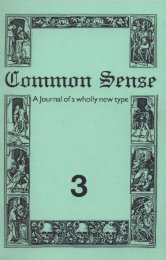i on thomas paine reviews: origins of crisis in ussr - Common Sense
i on thomas paine reviews: origins of crisis in ussr - Common Sense
i on thomas paine reviews: origins of crisis in ussr - Common Sense
You also want an ePaper? Increase the reach of your titles
YUMPU automatically turns print PDFs into web optimized ePapers that Google loves.
Trial by Space: Reflecti<strong>on</strong>s <strong>on</strong> Lefebvre Page 19<br />
"reasserti<strong>on</strong> <strong>of</strong> space <strong>in</strong> critical social theory" and an explorati<strong>on</strong> <strong>of</strong> the <strong>in</strong>tersecti<strong>on</strong> <strong>of</strong><br />
geography and the Marxist traditi<strong>on</strong>.<br />
Harvey, for example, has d<strong>on</strong>e much to advance our understand<strong>in</strong>g <strong>of</strong> the processes <strong>of</strong><br />
urban and regi<strong>on</strong>al restnctur<strong>in</strong>g over the last two decades. Sigruficant <strong>in</strong> this respect has<br />
been his attempts to elaborate up<strong>on</strong> the ways <strong>in</strong> which these processes manifest<br />
themselves <strong>in</strong> a spatially uneven way <strong>in</strong> and through the c<strong>on</strong>t<strong>in</strong>ual producti<strong>on</strong> and<br />
des'mcti<strong>on</strong> <strong>of</strong> the built envir<strong>on</strong>ment. This emphasis reflects Harvey's belief that<br />
"historical materialism has to be u p m to historical-geographical materialism" and this<br />
is to be achieved through "the <strong>in</strong>tegrati<strong>on</strong> <strong>of</strong> the producti<strong>on</strong> <strong>of</strong> space and spatial<br />
c<strong>on</strong>figurati<strong>on</strong>s as an active element with<strong>in</strong> the core <strong>of</strong> Marxian theoris<strong>in</strong>gW(l989 pp 6.4).<br />
Smith also seeks the <strong>in</strong>tegrati<strong>on</strong> <strong>of</strong> nature and space <strong>in</strong>to the Marxian theory <strong>of</strong> capitalist<br />
development and advances the propositi<strong>on</strong> "that uneven development is the hallmark <strong>of</strong> the<br />
geography <strong>of</strong> capitalism. ... the systematic geographical expressi<strong>on</strong> <strong>of</strong> the c<strong>on</strong>tradicti<strong>on</strong>s<br />
<strong>in</strong>herent <strong>in</strong> the very c<strong>on</strong>stituti<strong>on</strong> and structure <strong>of</strong> capital." Like Harvey, he draws up<strong>on</strong><br />
Mm's analysis <strong>of</strong> capitalism. "For", declares Smith. "when <strong>on</strong>e draws out the spatial<br />
implicati<strong>on</strong>s and dimensi<strong>on</strong>s <strong>of</strong> Mm's analysis, especially m Capital, the basis <strong>of</strong> uneven<br />
development theory is then ready at hand." (Smith 1990 pp xii, xvi). Soja disagrees with<br />
this <strong>in</strong>terpretati<strong>on</strong> <strong>of</strong> "Mm's analysis" but shares a comm<strong>on</strong> desire. By build<strong>in</strong>g <strong>on</strong> the<br />
work <strong>of</strong> Foucaul~ Giddens. Berger, Breman, James<strong>on</strong> and, above all, Henri Lefebvre, Soja<br />
seeks "to spatialise the historical narrative. to attach to duree an endur<strong>in</strong>g critical human<br />
gwgraphy .... to make room for the <strong>in</strong>sights <strong>of</strong> an <strong>in</strong>terpretative human geography, a spatial<br />
hermeneutic." (Soja 1989 ppl-2) This desire, by Soja and others, to redress the balance<br />
away from historicism and towards a new spatialised discourse <strong>of</strong> social change reflects a<br />
grow<strong>in</strong>g belief that c<strong>on</strong>temporary society is mov<strong>in</strong>g <strong>in</strong>to "the epoch <strong>of</strong> space" (Foucault<br />
1986 p22) <strong>in</strong> which the <strong>in</strong>nocent spatiality <strong>of</strong> social life hides c<strong>on</strong>sequences for us. As<br />
Soja, for example, puts it, "today ... it may be space more than time that hides<br />
c<strong>on</strong>sequences from us, the mak<strong>in</strong>g <strong>of</strong> geography' more than the 'mak<strong>in</strong>g <strong>of</strong> history' that<br />
provides the most reveal<strong>in</strong>g tactical and theoretical world." (1989 p 1) In this way,<br />
postmodemism becomes a periodis<strong>in</strong>g c<strong>on</strong>cept <strong>in</strong> which gwgraphy <strong>in</strong>creas<strong>in</strong>gly matters as<br />
a vantage po<strong>in</strong>t <strong>of</strong> critical <strong>in</strong>sight, <strong>on</strong>e which, <strong>in</strong> James<strong>on</strong>'s terms, "raise(s) spatial issues<br />
as a fundamental organis<strong>in</strong>g c<strong>on</strong>cern" (1984 p 89)<br />
The purpose <strong>of</strong> this review article, however, is not to address this c<strong>on</strong>temporary debate but<br />
to return to <strong>on</strong>e <strong>of</strong> its most important founders - Henri L$ebvre. Lefebvre was perhaps<br />
the most <strong>in</strong>fluential figure shap<strong>in</strong>g the course and character <strong>of</strong> French Marxist theory and<br />
philosophy from the early 1930's to at least the late 1950's. Furthermore. as Soja rightly<br />
po<strong>in</strong>ts out, he became, after the 1950's. the lead<strong>in</strong>g spatial theoretician <strong>in</strong> Western<br />
Marxism and the most forceful advocate for the reasserti<strong>on</strong> <strong>of</strong> space <strong>in</strong> critical social<br />
theory.(1989 p 47) But knowledge <strong>of</strong> his c<strong>on</strong>tributi<strong>on</strong> to this debate is still limited partly<br />
because few <strong>of</strong> his works have been translated <strong>in</strong>to English. More significant, however,<br />
is the fact that most Angleph<strong>on</strong>e commentators <strong>on</strong> Lefebvre have focused <strong>on</strong> his<br />
<strong>in</strong>volvement <strong>in</strong> existential Marxism and his critique <strong>of</strong> Althusser and usually pass over his<br />
<strong>in</strong>terest <strong>in</strong> space and spatiality with a cursory nod or even blank <strong>in</strong>comprehensi<strong>on</strong>.<br />
(chFY (1994) ~355)<br />
Accord<strong>in</strong>g to Soja (1989 p47), Hegelian <strong>in</strong>fluences permeate Lefebvre's early Marxism and<br />
this led him to reta<strong>in</strong> a strand <strong>of</strong> 'objective idealism' with<strong>in</strong> the materialist dialectic. He<br />
also took a stance, throughout his works, aga<strong>in</strong>st dogmatic reducti<strong>on</strong>ism <strong>in</strong> favour <strong>of</strong> a<br />
more open ended dialectic which resulted <strong>in</strong>, what Soja refers to as, a "flexible, open and<br />
cautiously eclectic Marxism able to grow and adapt without predeterm<strong>in</strong>ed truncati<strong>on</strong>."



